Coconut nectar syrup is both delicious and visually appealing. Even though it looks and tastes like maple syrup, it has a unique, wonderful coco-nutty flavor.
Often used in baking, certain sauces, and as a sweetener in drinks, coconut nectar is a versatile ingredient. Is there, however, a substitute for this product if you run out of coconut nectar or wish to use something else?
Maple sugar, Agave syrup, Raw honey, Brown Sugar, and Date Syrup are the five best coconut nectar substitutes. These are the most acceptable coconut nectar alternatives in terms of flavor, consistency, and color.
However, all these substitutes need to be substituted in a specific amount in your recipe so that you can get the exact taste and flavor. I have specifically tested all these substitutes and have written not only the exact amount that you can substitute in place of coconut nectar but also have written the health benefits of each substitute.
5 Best Coconut Nectar Substitutes
Coconut nectar is produced only from fresh coconut sap that is turned into syrup and is cultivated naturally. As a result, it includes a variety of trace minerals, including calcium, potassium, magnesium, iron, phosphorus, zinc, and other trace elements(1).
All of these minerals are beneficial for the brain, blood, and the entire system benefit. Strong bones and teeth, a healthy heart, and better immune system functioning are just a few of the health advantages of this product(2).
Coconut nectar syrup has a lower fructose content than table sugar. This indicates that this sweetener is digested more beneficially by the liver(3).
In addition, this natural sweetening ingredient has a lower likelihood of converting to fat. Fats that are harmful to the body can attach to organs and systems, resulting in illnesses such as stroke, obesity, and atherosclerosis(4).
It is necessary to remember that coconut nectar syrup has a significant caloric content (same as regular sugar).
However, if you are unable to locate it or prefer another option, the following list might assist you in selecting the best substitutes for coconut nectar for your next meal.
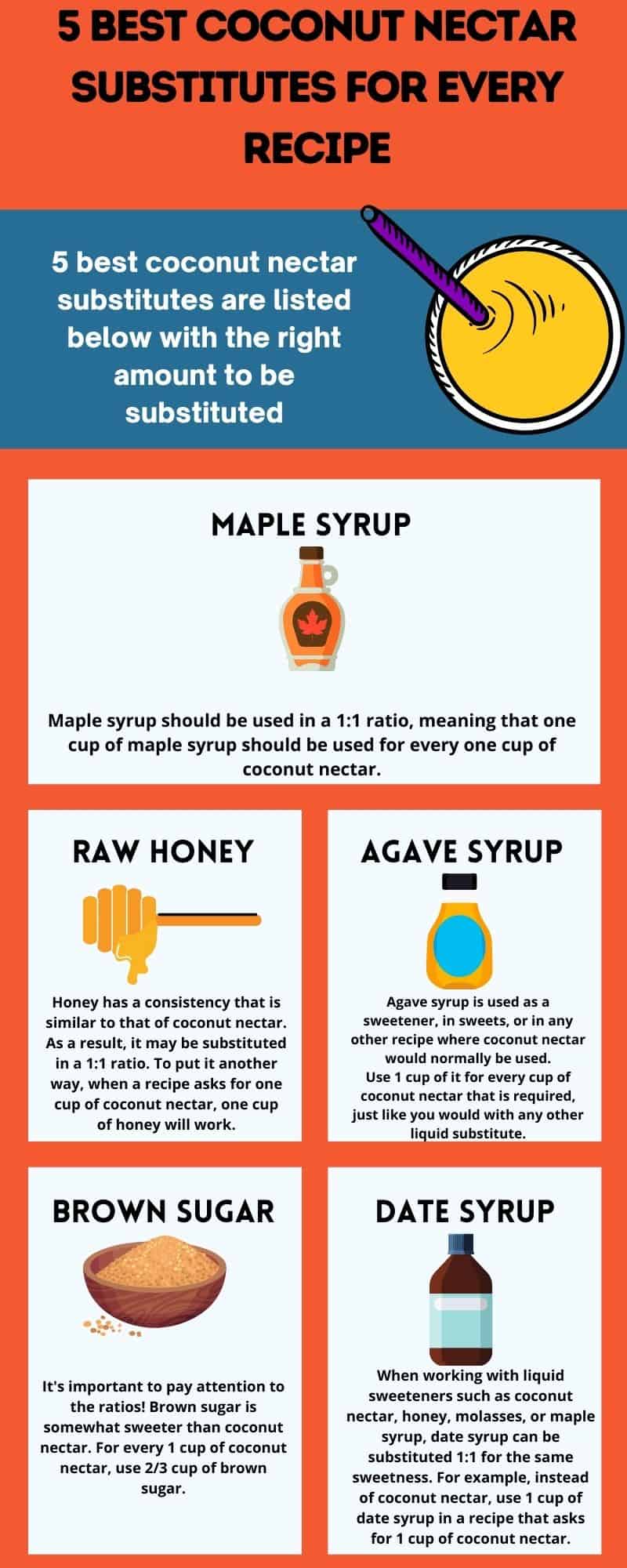
1. Maple syrup
Maple syrup, which is derived from plants such as black maple, red maple, and sugar maple, can be used to substitute for coconut nectar.
This isn’t your average pancake syrup. Instead, I am talking about organic maple syrup that is 100 percent pure and natural.
What distinguishes it as a superior option to coconut nectar is that it includes a significant quantity of vital minerals such as zinc, manganese, calcium, potassium, and iron(5).
And because it is derived directly from tree sap, it has little processing (sometimes consisting of heating to remove the water) before reaching its final traditional form.
The darker the maple syrup, the better since it has a larger level of antioxidant activity than lighter maple syrup. Regardless of these positive characteristics, keep in mind that maple syrup is still high in sugar; thus, moderation is essential.
How Much Can You Substitute Maple Syrup for Coconut Nectar?
Maple syrup has a texture that is similar to that of coconut nectar, and it may be used in baking as well as for pouring over food.
Maple syrup should be used in a 1:1 ratio, meaning that one cup of maple syrup should be used for every one cup of coconut nectar.
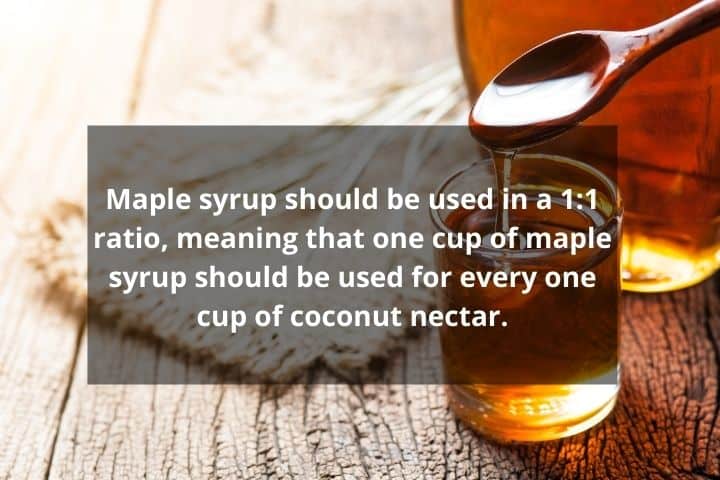
Health Benefits of Maple Syrup
The health benefits of using maple syrup are numerous as compared to coconut nectar:
- Pure maple syrup is packed with antioxidants that are anti-inflammatory, anti-cancer, and antibacterial.
- Maple syrup also includes significant levels of calcium, iron, magnesium, potassium, zinc, copper, and manganese, among other trace elements and minerals. These minerals perform several important functions in your body, including cell creation, the maintenance of healthy red blood cells, and immunological support, to name a few.
- Maple syrup has elements of caramel and vanilla, which give it a pleasant fragrance.
Drawbacks of Using Maple Syrup as Coconut Nectar Substitute
The high sugar content of maple syrup is one of the most significant health concerns associated with it. Sugar consumption in excess can cause a variety of health concerns. Before you consume maple syrup, keep the following points in mind:
- This natural sweetener has a higher caloric content, which is equivalent to that of conventional table sugar.
- As a high-calorie item, it should come as no surprise that maple syrup has 12 grams of sugar in a single tablespoon, which is rather alarming.
- The glucose and fructose content in maple syrup is higher than that of coconut nectar syrup.
- Maple syrup has a higher glycemic index than coconut nectar. Due to this, it can cause an increase in blood sugar levels. Unwanted weight gain can occur as a result of persistently elevated blood sugar levels.
If you want to read about maple and its substitutes then checkout Best Maple Syrup Substitutes.
2. Raw honey
Raw honey is undoubtedly one of the most popular alternative sweeteners globally, thanks to the honeybee, one of the most remarkable organisms on the planet and one of the world’s greatest pollinators.
Bees take the sweet nectar from flower buds and turn it into honey.
The raw, unprocessed form of honey is a thick crystalline paste or thick viscous liquid that maintains all of the nutrients, live enzymes, and medicinal components that honey is known for. Honey is also a natural preservative.
It is by far the most nutrient-dense of the natural sweeteners on our list of healthy alternatives of coconut nectar.
In addition to being a source of antibacterial and antifungal qualities due to the presence of bee pollen and propolis, honey also has antiviral and antifungal properties that have been used to decrease inflammation, strengthen the immune system, and help digestive processes throughout history(6).
Raw honey is offered in varieties and grades in the commercial marketplace. In terms of color, they can range from solid yellow/white to dark amber or black.
In addition to having a more crystalline texture, non-filtered honey may also have a lighter cream color due to the presence of glucose crystals and a higher wax, pollen, and propolis content.
How Much Can You Substitute Raw Honey for Coconut nectar?
Honey has a consistency that is similar to that of coconut nectar. As a result, it may be substituted in a 1:1 ratio. To put it another way, when a recipe asks for one cup of coconut nectar, one cup of honey will work.
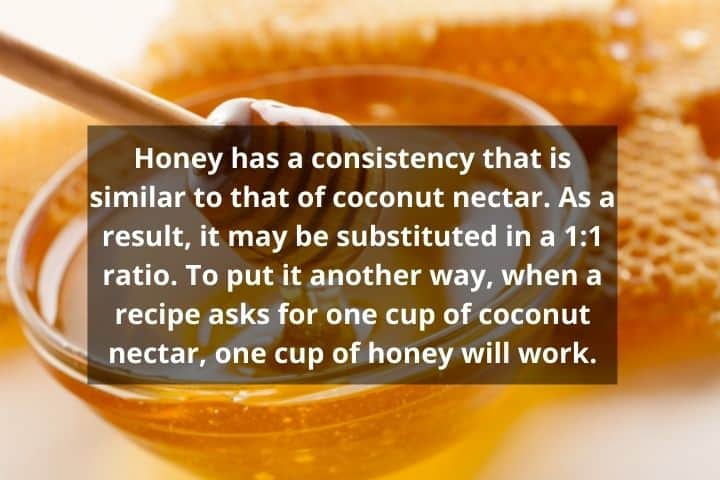
Health Benefits of Raw Honey
There are several advantages of using honey, including the following:
- Honey has been shown to decrease cholesterol levels. (7)
- It also has the additional benefit of lowering blood pressure. (8)
- Because of its “raw” origin, honey has the advantage of containing Vitamin C and antioxidants, which are beneficial to one’s health.
Drawbacks of Using Raw Honey as Coconut Nectar Substitute
The downside of using honey as coconut nectar substitute include:
- Honey has a significant amount of sugar which is harmful to your overall health.
- It contains more fructose than coconut nectar, which is unsuitable. Fructose is harmful in large quantities.
- Honey has the potential to induce hypersensitivity.
- Honey can cause bloating and gas.
Checkout my special edition on honey and its substitutes.
3. Agave Syrup
Another option for substituting coconut nectar in cooking is to use agave syrup instead.
This syrup is sweet and has a somewhat similar flavor to honey and maple, making it an excellent alternative for coconut in your cuisine.
In addition, there is a bitterness to the aftertaste of agave, which distinguishes this syrup from other alternatives.
Agave is typically used in baking, although it may also be included in dressings, sauces, and uncooked desserts. It comes in three distinct flavors (light, amber, and dark), and the darker it grows, the more flavor and complexity it has.
When making the switch, keep in mind the consistency and texture of the original recipe and make the necessary adjustments.
How Much Can You Substitute Agave Syrup for Coconut nectar?
Agave syrup is used as a sweetener, in sweets, or in any other recipe where coconut nectar would normally be used.
Use 1 cup of agave syrup for every cup of coconut nectar that is required in a recipe.
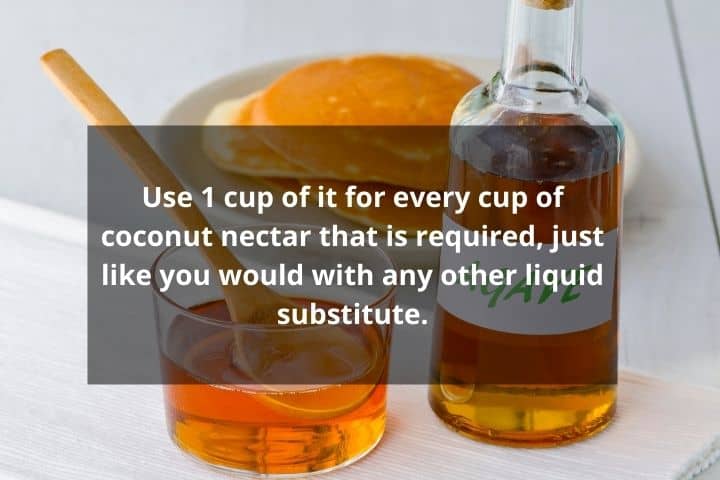
Health Benefits of Agave Syrup
The following are some of the advantages of agave:
- It has a low glycemic index (GI), which means it is good for you. If you have diabetes, eating a low-GI diet may help you maintain better control over your blood sugar levels(9).
- It is beneficial for your metabolism. Vitamin B6, which is found in agave, is important in the digestion of food, particularly proteins and carbs, by the body.
- Agave is beneficial in the treatment of depression. The presence of vitamin K and folate in agave syrup has positive effects on mental health
- It has the potential to be beneficial to your heart. Homocysteine levels are kept low with the aid of vitamin B6, which is present in agave. This helps to keep you safe from heart disease and stroke.
Drawbacks of Using Agave Syrup as Coconut Nectar Substitute
If you consume a significant amount of agave syrup at once, you may experience certain negative side effects:
- The calories in agave syrup are greater, with 21 percent of the total calories in a teaspoon. When compared to coconut sugar, this is a larger percentage. Although each person’s body processes food differently, high-calorie syrups quickly convert into fat when consumed in large quantities.
- The fructose content of this sweetener is 84 percent. When you consume a lot of fructose, your liver may not be able to manage the process of turning fructose into energy.
- The higher consumption of agave syrup results in increased triglyceride levels as well as lipogenesis. Both of these variables have the potential to cause severe heart disease in certain people.
4. Brown Sugar
Brown sugar is just sugar that has been treated with molasses to make it brown. Molasses is responsible for their unique flavor and dark color.
Brown sugar has a rich, almost coffee-like, or caramel flavor that is virtually impossible to describe.
Is it possible to substitute brown sugar with coconut nectar? Yes, it is an excellent alternative because both of them in their raw form have the same texture, flavor, and color. In addition, they fully dissolve in beverages and recipes.
Brown sugar is a cost-effective and easily accessible alternative to coconut nectar that serves to be an excellent substitution.
How Much Can You Substitute Brown Sugar for Coconut nectar?
It’s important to pay attention to the ratios! Brown sugar is somewhat sweeter than coconut nectar. For every 1 cup of coconut nectar, use 2/3 cup of brown sugar.
If you’re using brown sugar for coconut nectar, you might want to consider increasing the amount of liquid in the recipe.
A spoonful of natural applesauce will provide you with the moisture you require for the recipe while also providing an additional dose of natural sweetness.
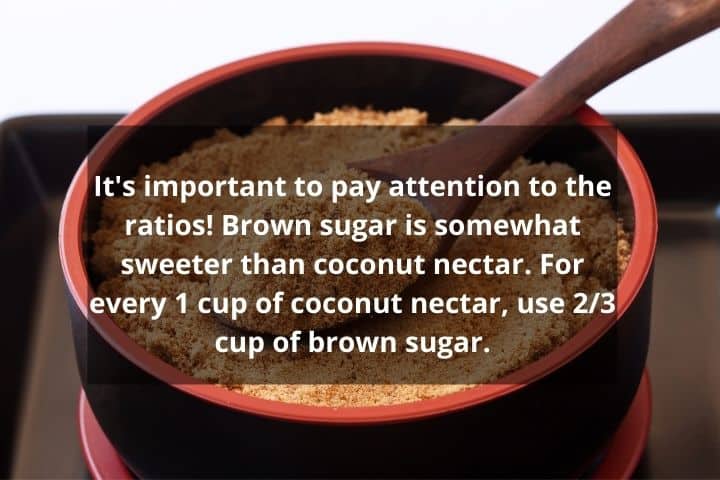
Health Benefits of Brown Sugar
If you are considering utilizing brown sugar as a substitute for coconut nectar, here are some of the health benefits of brown sugar that you should be aware of:
- A simple carbohydrate, brown sugar, is similar to normal sugar in composition. Thus, the body reaps the nutritional advantages of brown sugar because it can quickly break it down into glucose, which provides rapid energy.
- If you suffer from stomach cramps during your period, the advantages of brown sugar may be able to provide you with some temporary relief. This property is due to the presence of potassium, which aids in the relaxation of body muscles, particularly those in the vicinity of the uterus.
- Since brown sugar is high in minerals such as iron, copper, and phosphorus, it is extremely useful for those who suffer from vitamin and mineral deficiencies. Furthermore, it is very beneficial for pregnant women who are suffering from gestational anemia(10).
- One of the most significant advantages of brown sugar is its nutritional density. By adding it to the meal, you can incorporate a variety of naturally occurring minerals into your diet. These include minerals such as iron, magnesium, calcium, sodium, potassium, and others. Adding a teaspoon of brown sugar to your daily cup of tea can provide over 20% of your recommended daily intake of iron and calcium, as well as help restore your body’s natural electrolyte balance.
Drawbacks of Using Brown Sugar as Coconut Nectar Substitute
Some of the drawbacks of using brown sugar as a coconut substitute are explained below:
- Since coconut nectar is less processed than brown sugar, it maintains trace levels of nutrients such as vitamins and minerals as well as antioxidants, amino acids, and other beneficial plant-based compounds.
- Brown sugar does not contain any of these trace quantities of vitamins, minerals, or other beneficial ingredients. Brown sugar is as bad for you as you consider normal sugar to be.
I have written an extremely detailed article on brown sugar and its substitutes. Check it out.
5. Date Syrup
Date syrup is another product that may be used in place of coconut nectar in a variety of dishes, such as desserts.
Date syrup is more than simply sugar; it’s a food derived directly from the fruit, which makes it unique.
Date syrup is one of the most delicious and widely used items that can be created by processing dates.
It is not only delicious and sweet, but it also has all of the health advantages that dates provide(11). As a result, date syrup may be used as a substitute for coconut nectar in a variety of recipes.
For those who like eating sweet foods and sweets, date syrup may be their best friend. It is delicious, nutritious, and simple to integrate into a variety of various dishes.
Even though producing date syrup at home is simple, purchasing pre-made items at the market is more convenient. However, always examine the ingredients to ensure that you are not purchasing items that include additives such as sugar, oil, or any artificial color.
How Much Can You Substitute Date Syrup for Coconut nectar?
You can use date syrup in baking, cooking, or as a topping; the possibilities are endless!
When working with liquid sweeteners such as coconut nectar, honey, molasses, or maple syrup, date syrup can be substituted 1:1 for the same sweetness. For example, instead of coconut nectar, use 1 cup of date syrup in a recipe that asks for 1 cup of coconut nectar.
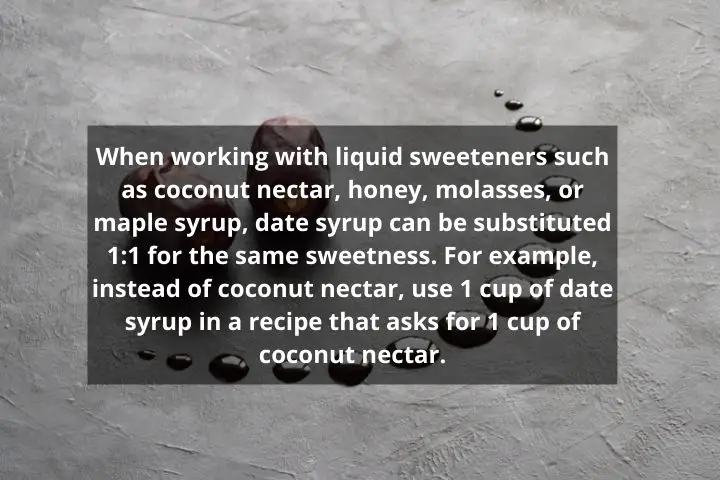
Health Benefits of Date Syrup
Because date syrup is prepared from pitted dates, it has the sweet flavor of this fruit while still providing all of the nutritional advantages of dates:
- Dates contain a high concentration of antioxidants, which makes any products containing dates beneficial to the immune system(12).
- Date syrup has antibacterial properties(13).
- Our bodies require a variety of minerals and vitamins throughout the day to be healthy and strong. On the other hand, dates include the minerals and vitamins that the body needs, such as zinc, magnesium, potassium, calcium, and iron. It also includes essential vitamins such as vitamin C, vitamin B6, and vitamin A, all of which are good for the health.
- Dates contain a lot of calories. Even a single spoon of date syrup in the morning might provide you with sustained energy throughout the day.
- Date syrup has a significant amount of fiber.
- Dates have no cholesterol, and because this product is prepared without the use of any additives, it is beneficial to one’s heart health. Individuals with cardiovascular problems can thus consume date syrup without having to worry about increasing their cholesterol level(14).
Drawbacks of Using Date syrup as Coconut Nectar Substitute
Some of the cons of using date syrup as coconut nectar substitute include:
- Date syrup has a higher glycemic index as compared to coconut nectar(15).
- Date syrup manufactured commercially is created by extracting the thick, sticky liquid from cooked dates, which means that the fiber that is beneficial to health does not make it into the finished product. In addition, several minerals and vitamins are lost as a result of the procedure.
- When compared to whole dates and homemade whole food date syrup, store-bought date syrup has a high-calorie count and a low concentration of beneficial nutrients.
- Date syrup has anywhere from 250 to 320 calories. This leads to date syrup being a high-calorie sweetener, which means it should be used with caution while baking. As a result of ingesting little amounts of date syrup, you will only absorb a small number of nutrients such as potassium, iron, and calcium from date syrup(16).
Take Away
Coconut nectar is generally considered to be a healthier alternative to white sugar, and it is simple to substitute. Instead of coconut nectar, I have selected five of the best coconut nectar substitutes that you may use if you don’t have any on hand.
Each of these coconut nectar substitutes has a flavor that is comparable to the others, with just a handful of them being somewhat sweeter. Because of this, you can use a 1:1 ratio for most of these alternatives and obtain the same effects as using coconut nectar.
Which one of the substitutes would you pick? Tell us about your favorite coconut nectar substitute in the comments section below!

A nutrition degree holder and a foodie by heart, Madiha Saad loves to inspire people through her writings and uses her knowledge and experience to write articles on trending nutrition topics. She loves to develop new recipes in her pastime. Read More…
Leave a Reply